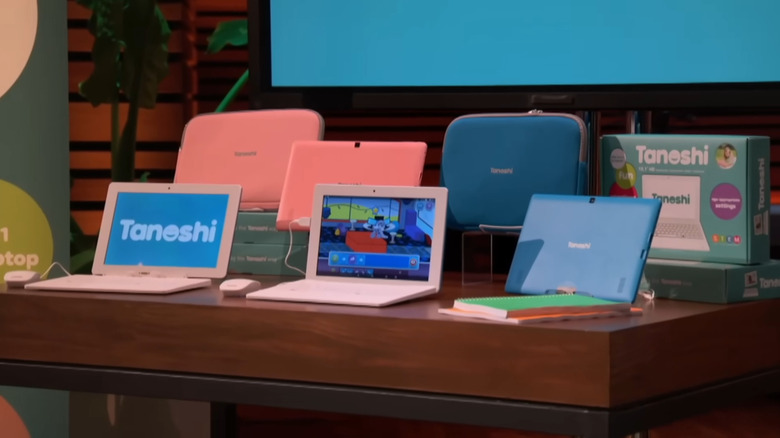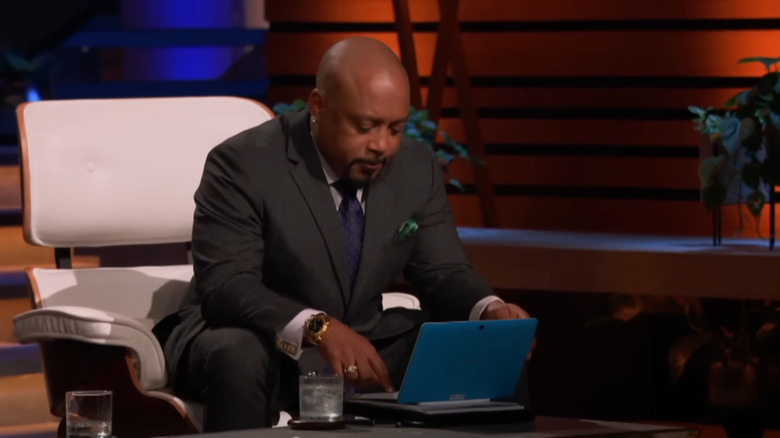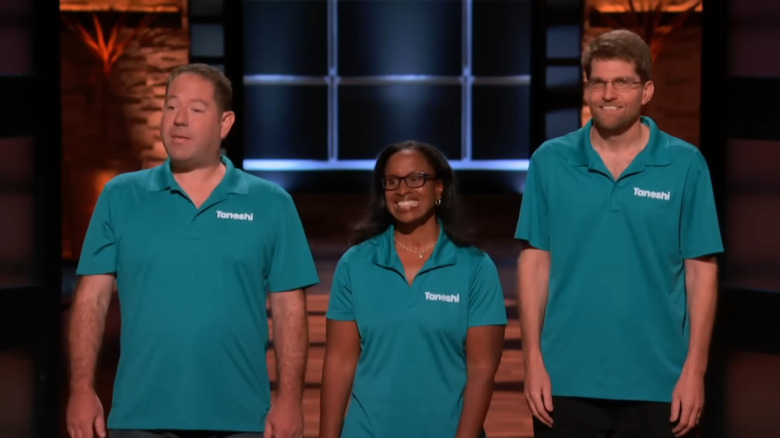What Happened To The Tanoshi Kids Computer From Shark Tank Season 11?
The 21st episode of the 11th season of ABC's "Shark Tank" premiere on May 6, 2020 to an audience of 2.39 million people according to Nielsen Media Research's viewership ratings. The second of four pitches that week, which can be watched for free on the Sony Pictures Television YouTube channel, was for Tanoshi, an Android-based two-in-one tablet computer specifically made for kids. During their presentation, the entrepreneurs had a bit of an uphill battle in selling the Sharks on the company, thanks in large part to the low margins on their tablets. However, one Shark understood this was endemic to consumer electronics in general, and so they didn't have the same concerns as his castmates, eventually closing the segment by making a deal with Tanoshi.
However, it gets a bit rocky from there. We don't know for sure if the deal closed subsequent to the completion of the due diligence process after filming, although it seems likely that it did. Regardless, Tanoshi has since found itself repeatedly soliciting new investors in the years since the episode aired. To make matters a lot worse, though, the company has been out of stock on its core product for well over a year as of this writing, describing it as discontinued for much of that time. There have been occasional signs of life, including a trip to CES 2024 in Las Vegas, but overall, it's unclear where Tanoshi stands now. Let's unpack all of this in detail and see how we got here.
What happened to the Tanoshi Kids Computer on Shark Tank?
Greg Smith, Lisa Love, and Brad Johnston entered the tank seeking a $500,000 investment for an 8% equity stake in Tanoshi (Japanese for "fun"), their child-centric computer company. A two-in-one tablet/laptop that comes preloaded with "age-appropriate and educational content," it includes built-in parental controls, including the ability for parents to freeze the ability to use the computer from their own personal mobile devices.
Perennial Shark Kevin O'Leary questioned why the iPad wouldn't just crush them, and the answer he got was the price: $199. This was less than half the retail price of an iPad, but Tanoshi didn't have a lot of room in their margins, though. The landed cost of the device was $120, meaning that there was little room to try to sell it at retail as it sat at the time, though Daymond John interjected that consumer electronics — computers included — aren't particularly high margin, which Johnson agreed with. In 18 months, Tanoshi had done $720,000 in sales.
Mark Cuban opted out because he didn't see Tanoshi scaling beyond its current sales levels, with Kevin O'Leary following because he felt the push into hardware instead of as a software licensing play was hopeless. Guest Shark Anne Wojcicki was next, feeling customer acquisition was too hard, followed by Lori Greiner, who felt it wasn't right for her. Daymond, however, was willing to do it at $500,000 for 20% contingent on securing a licensing deal, and the Tanoshi team agreed.
What happened to Tanoshi after Shark Tank?
It's unclear if Daymond John's deal with Tanoshi closed after the two sides completed due diligence subsequent to filming the aforementioned "Shark Tank" episode. He doesn't keep an official list of "Shark Tank" investments like some of his castmates do, so we have to look for other clues. On his account on X, the platform formerly known as Twitter, he only ever posted about it the night that the episode premiered in May 2020. Those posts included one where he linked Tanoshi's website to make it easier for viewers to research and order the kid-oriented computers.
John also provided a quote to Tanoshi for a press release the company issued the morning after its "Shark Tank" episode premiered. "The Tanoshi team's pitch really spoke to me," he said. "Their focus on making education more accessible through the availability of affordable tech for kids is inspiring, especially considering recent developments with so many parents having to juggle homeschooling as well as numerous kids who are at home without access to computers." Taken together, this is certainly more than we usually expect from sharks who didn't make a final deal after filming.
However, if Daymond John invested, his money didn't get Tanoshi very far. The following year, Tanoshi launched an equity crowdfunding campaign on StartEngine, but it's not at all clear how much money the company raised, if any. A November 2021 SEC filing, though, mentions $115,567 in losses for Tanoshi's prior fiscal year.
Is Tanoshi still in business?
If Tanoshi is still a functional business, then it's in the middle of some kind of massive restructuring, but that seems unlikely. Perhaps most tellingly, in what may be a first, the company website stopped working as we were working on this article, replaced be a "Sorry, this store is currently unavailable." message from Shopify, the storefront provider that Tanoshi used. As it sat before it stopped working, it listed its lone computer as sold out and discontinued, though some accessories were still in stock. Using the Wayback Machine on The Internet Archive to check older cached copies of the site, we can see that the computer was listed as discontinued since at least October 2023 and sold out since at least May 2022. If Tanoshi has been selling computers since 2022, its website is a terrible indicator.
Tanoshi's social media shows slightly more signs of life, albeit depending on the platform. Nothing is updated on a regular basis anymore, but its Instagram was last updated in November 2024 and its LinkedIn in December 2024. Perhaps most interestingly, in January 2024, the LinkedIn account posted a video about attending CES 2024, but if that led to any business deals, whether as a manufacturer or a licensor, there's no indication of that on Tanoshi's various internet presences. When there's social media activity from a company that otherwise seems dead, it always makes you wonder what's up, but there's nothing here to indicate that it's anything substantive.
What's next for Tanoshi and its founders?
As of this writing, there are no indications on the Tanoshi LinkedIn page that the company intends to have a presence at the 2025 Consumer Electronics Show in Las Vegas, the way that it did in 2024. It seems fair to assume that Tanoshi won't be there and that we should be treating the company as dormant, if not outright dead. What about the founders, though?
If we go by their LinkedIn pages, then CEO/Head of Product Brad Johnston and co-CEO Lisa Love are still listed as being part of Tanoshi in those specific roles. At least as recently as June 2024, they both posted on their respective LinkedIn blogs that they were initiating a new seed round to bring investors into the company, but there's been no follow-up since then. Johnston still posts occasionally on X, the platform previously known as Twitter, last mentioning Tanoshi in the context of expressing frustration about investors' lack of interest in the company in a November 2024 post.
Love, however, has left her account dormant since March 2023. As for Greg Smith, the third Tanoshi rep on "Shark Tank," his LinkedIn shows he left his job there as Project Manager, IT Lead, QA Lead in July 2022, eventually resurfacing 14 months later as a Quality Assurance Specialist at Fingerpaint, a marketing agency. All told, it looks like Tanoshi is on life support. The question is if Johnston and Love are ready to pull the plug.




